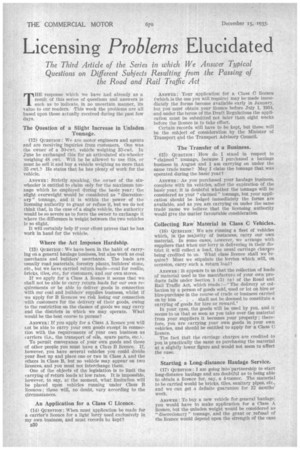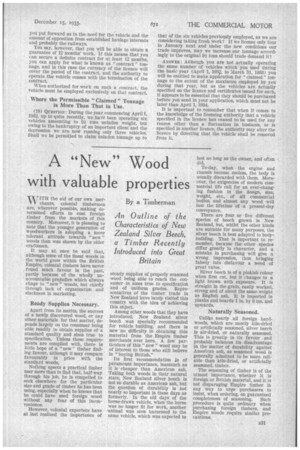Licensing Problems Elucidated
Page 48

Page 49

If you've noticed an error in this article please click here to report it so we can fix it.
The Third Article of the Series in which We Answer Typical Questions on Different Subjects Resulting from the Passing of the Road and Rail Traffic Act
THE response which we have had already as a result of this series of questions and answers is such as to indicate, in no uncertain Manner, its s slue to our readers. This week the problems are all based upon those actually received during the past few clays.
The Question of a slight Increase in Unladen Tonnage.
(12) QUESTION: We are motor engineers and agents and are receiving inquiries from customers. One was the owner of a 30-cwt. vehicle weighing 35-cwt. lu June he exchanged this for an articulated six-wheeler weighing 48 cwt. Will he be allowed to use this, or must he sell it and buy a vehicle weighing no more than 35 cwt.? He states that he has plenty of work for the vehicle.
ANswsu: Strictly speaking, the owner of the sixwheeler is entitled to claim only for the maximum tonnage which he employed during the basic year ; the slight overweight would be considered as " discretionary " tonnage, and it is within the power of the licensing authority to grant or refuse it, but we do not think that, in the case of a single vehicle, the authority would be so severe as to force the owner to exchange it where the difference in weight between the two vehicles is so slight.
It will certainly help if your client proves that he has work in hand for the vehicle.
Where the Act Imposes Hardship.
•
(13) QUESTION: We have been in the habit of carry
ing on a general haulage business, but also work as coal merchants and builders' merchants. The loads are usually road materials, forestry plants, builders' stone, etc., but we lave carried return loads—coal for resille, bricks, tiles, etc., for customers, and our own stores.
If we apply for a Class A licence it seems that we shall not be able to carry return loads for our own requirements or be able to deliver goods in connection with our coal and builders' supplies business, whilst if we apply for B licences we risk losing our connection with customers for the delivery of their goods, owing to the restriction on the classes of goods we may carry and the districts in which we may operate. What would be the best course to pursue?
ANSWER: If you apply for a Class A licence you will Lot be able to carry your own goods except in connection with the requirements of your own business as carriers (i.e., the transport of oils, spare parts, etc.).
To permit conveyance of your own goods and those of other people you must have a Class B licence. If, however, you have several vehicles you could divide your fleet up and place one or two in Class A and the others in Class B, but no vehicle may appear on two licences, and you must not interchange them.
One of the objects of the legislation is to limit the carrying of return loads at low rates. It is impossible, however, to say, at the moment, what limitation will be placed upon vehicles running under Class B licences; these will, no doubt, vary according to the Circumstances.
An Application for a Class C Licence.
(14) QUESTION: When must application be made for a carrier's licence for a light lorry used exclusively in my own business, and must records be kept? ANSWER: Your application for a Class C licence (whichis the one you will require) may be.anade immediately the forms become available early in January, but you must obtain your licence before July 1, 1934, -and under the terms of the Draft Regulations the application must be submitted not later than eight weeks before the licence is to take effect.
Certain records will have to be kept, but these will be the subject of consideration by the Minister of Transport and the Transport Advisory Council.
The Transfer of a Business.
15) QUESTION: How do I stand in respect to " claimed " tonnage, because I purchased a haulage business in August and I am carrying on under the same trade name? May I claim the tonnage that was operated during the basic year?
ANSWER: As you purchased your haulage business, Complete with its vehicles, after the expiration of the basic year, it is doubtful whether the tonnage will be considered as your " claimed " tonnage, but your application should be lodged immediately the forms are available, and as you are carrying on under the same trade name we believe that the licensing authority would give the matter favourable consideration.
Collecting RawMaterial in Class C Vehicles..
(16) QUESTION: We are numing a fleet of vehicles which, in the majority of instances, carry our own material. In some cases, however, we arrange with suppliers that when our lorry is delivering in their district it will collect a load, the usual carriage chairs being credited to us. What class licence shall we require? Must we stipulate the lorries which will, on occasion, carry such a return load?
ANSWER: It appears to us that the collection of loads' of material used in the manufacture of your own products falls under Section 1 (5) (a) of the Road and Rail Traffic Act, which reads :—" The delivery or collection by a person of goods sold, used or let on hire or hire-purchase in the course of trade or business carried on by him . . . shall not be deemed to constitute a carrying of goods for hire or reward."
In your case, the goods will be used by you, and it seems to us that so soon as you take over the material from your suppliers it becomes your property; therefore, you are carrying your own goods in your own vehicles, and should be entitled to apply for a Class C licence.
The fact that the carriage charges are credited to you is practically the same as purchasing the material at a slightly lower figure and would not seem to affect the case.
Starting a Long-distance Haulage Service.
(17) QUESTION: I am going into partnershipto start long-distance haulage and am doubtful as to being able• to obtain a licence for, say, a 4-tonner. The material to be carried would be bricks, tiles, sanitary pipes, etc., and we can get a definite guarantee for 12 months' work.
ANSWER: To buy a new vehicle for general haulage, you would have to make application for a Class A licence, but the unladen weight would be considered as " discretionary " tonnage, and the grant or refusal of the licence would depend upon the strength Of the case
you put forward as to the need for the vehicle and the amount of opposition from established haulage interests and probably the railways.
You say, however, that you will be able to obtain a guarantee of 12 months work. If this means that you can secure a definite contract for at least 12 months, you can apply for what' is known as " contract " tonnage, and in this ease the currency of the licence will cover the period of the contract, and the authority to operate the vehicle ceases with the termination of the contract.
When authorized for workon such a contract, the vehicle must be employed exclusively on that contract.
Where the Permissible "Claimed" Tonnage is More Than That in Use.
(18) QUESTION: During the year. commencing April 1, 1932, up to quite recently, we have been operating six vehicles amounting to 91 tons unladen weight, but owing to the bankruptcy of an important client and the depression we are now running only three vehicles. Shall we be permitted to claim unladen tonnage up to
that of the six vehicles previously employed, as we are considering taking fresh work? If we license only four in January next and under the new conditions our trade improves, may we increase our tonnage accordingly to the original 91 tons should trade demand it?
ANSWER: Although you are not actually operating the same number of vehicles which you used during the basic year (April 1, 193.;, to March 31, 1933) you will be entitled to make application for " claimed " tonnage to the extent of the maximum employed by you during that year, but as the vehicles are actually specified on the licence and certificates issued for each, it appears to be essential that they should be purchased before you send in your application, which must not be later than April 1, 1934.
It is important to remember that when it comes to the knowledge of the licensing authority that a vehicle specified in the licence has ceased to be used for any reason other than a fluctuation in business, or is specified in another licence, the authority may alter the licence by directing that the vehicle shall be removed from it.




































































































